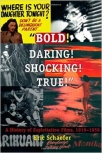Dulce et Decorum Est
by Wilfred Owen., 1893 - 1918
Bent double, like old beggars under sacks,Wilfred Owen was one of a large group of talented literary types who went off to fight World War I and died there. To his death can be added those of H. H. Munro ("Saki"), Rupert Brooke, Edward Thomas, Guillaume Apollinaire and many more. Who is to know whether some future Nobel Prize in Literature would have been awarded to one or more of these people, who instead died in the prime of their creative lives?
Knock-kneed, coughing like hags, we cursed through sludge,
Till on the haunting flares we turned our backs
And towards our distant rest began to trudge.
Men marched asleep. Many had lost their boots
But limped on, blood-shod. All went lame; all blind;
Drunk with fatigue; deaf even to the hoots
Of tired, outstripped Five-Nines that dropped behind.
Gas! Gas! Quick, boys!—An ecstasy of fumbling,
Fitting the clumsy helmets just in time;
But someone still was yelling out and stumbling
And flound’ring like a man in fire or lime...
Dim, through the misty panes and thick green light,
As under a green sea, I saw him drowning.
In all my dreams, before my helpless sight,
He plunges at me, guttering, choking, drowning.
If in some smothering dreams you too could pace
Behind the wagon that we flung him in,
And watch the white eyes writhing in his face,
His hanging face, like a devil’s sick of sin;
If you could hear, at every jolt, the blood
Come gargling from the froth-corrupted lungs,
Obscene as cancer, bitter as the cud
Of vile, incurable sores on innocent tongues,—
My friend, you would not tell with such high zest
To children ardent for some desperate glory,
The old Lie: Dulce et decorum est
Pro patria mori.
Dulce et decorum est pro patria mori is a line from the Roman lyrical poet Horace's Odes. The line can be roughly translated into English as: "It is sweet and right to die for your country." Here Owen uses it ironically and calls it "the old Lie".











0 Comments:
Post a Comment